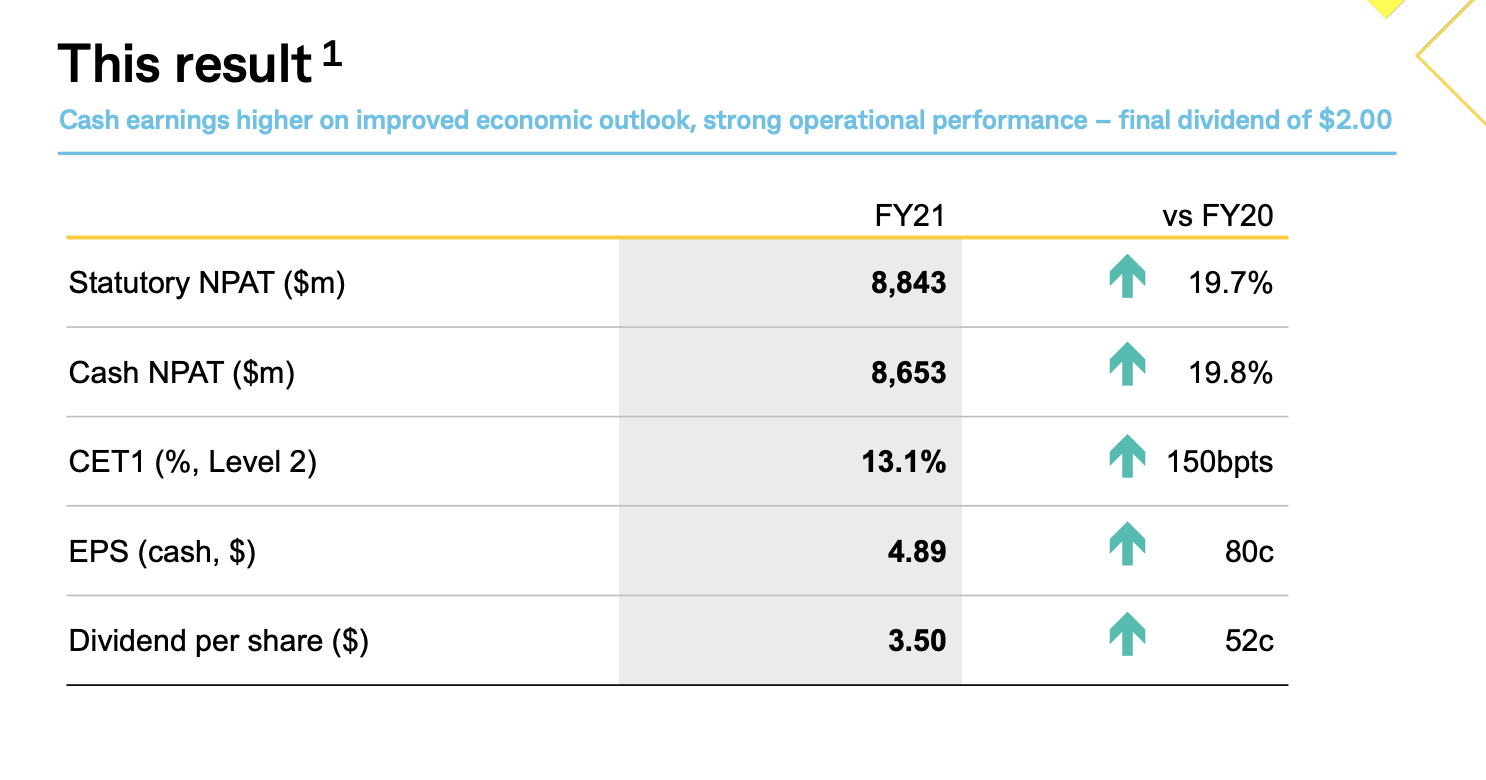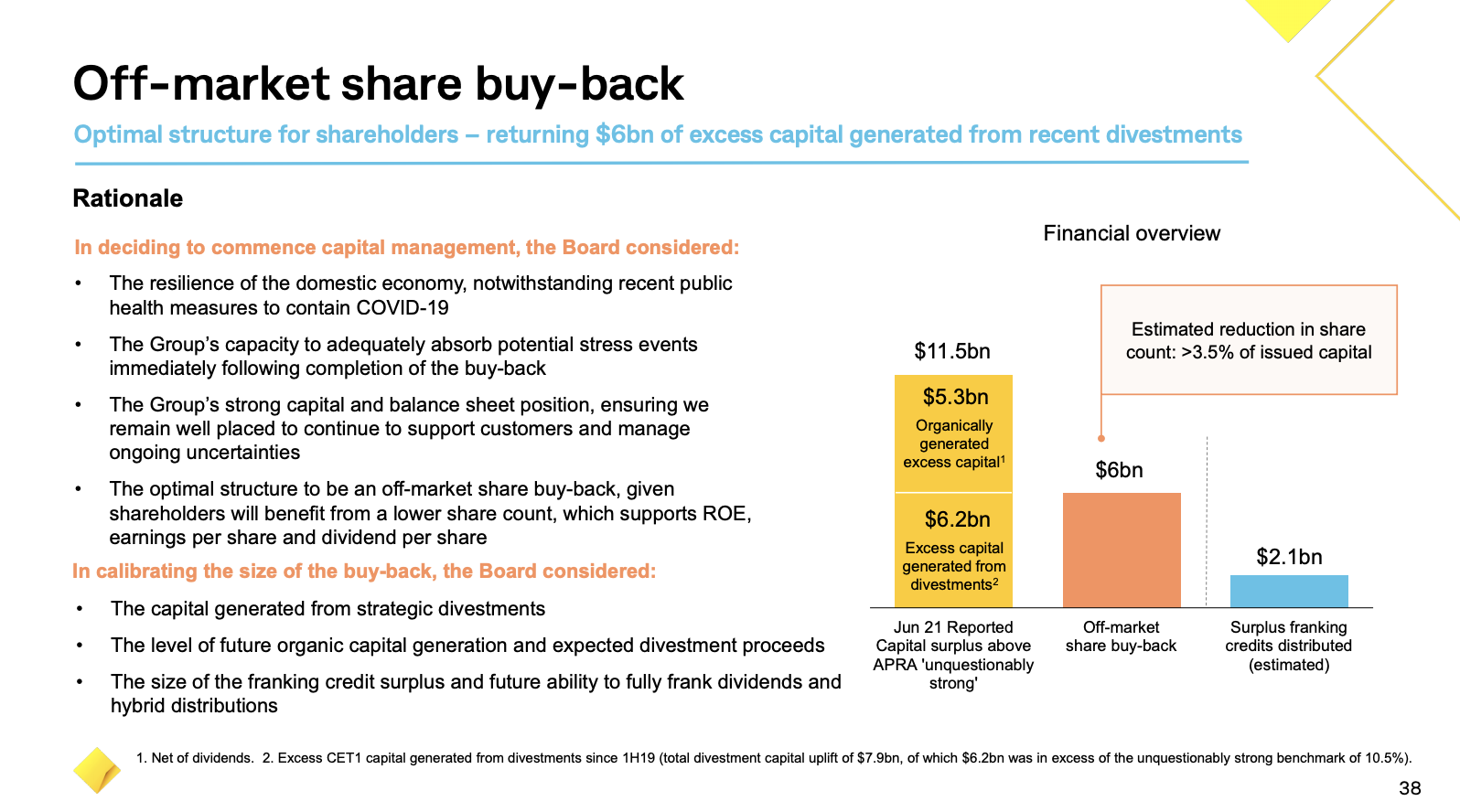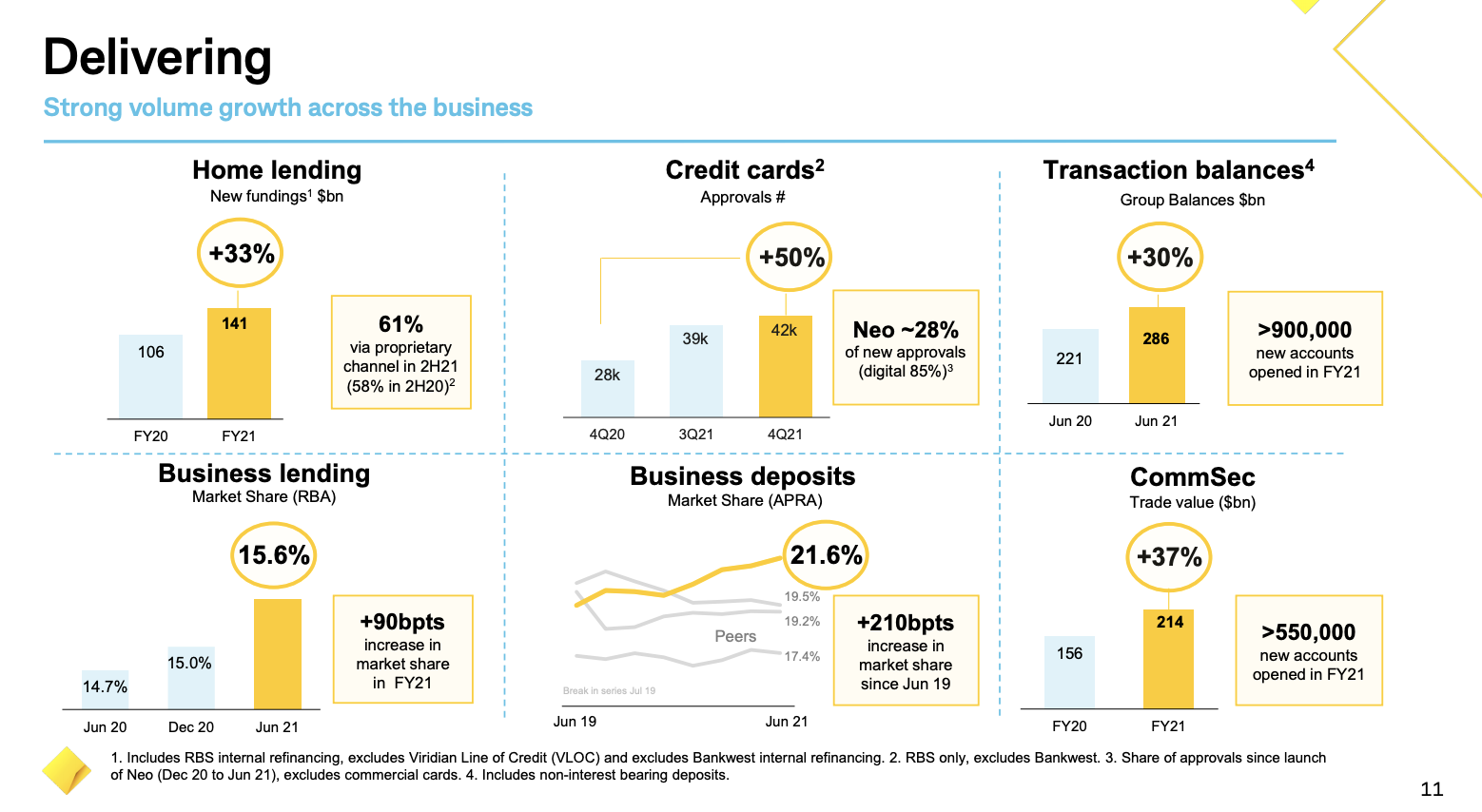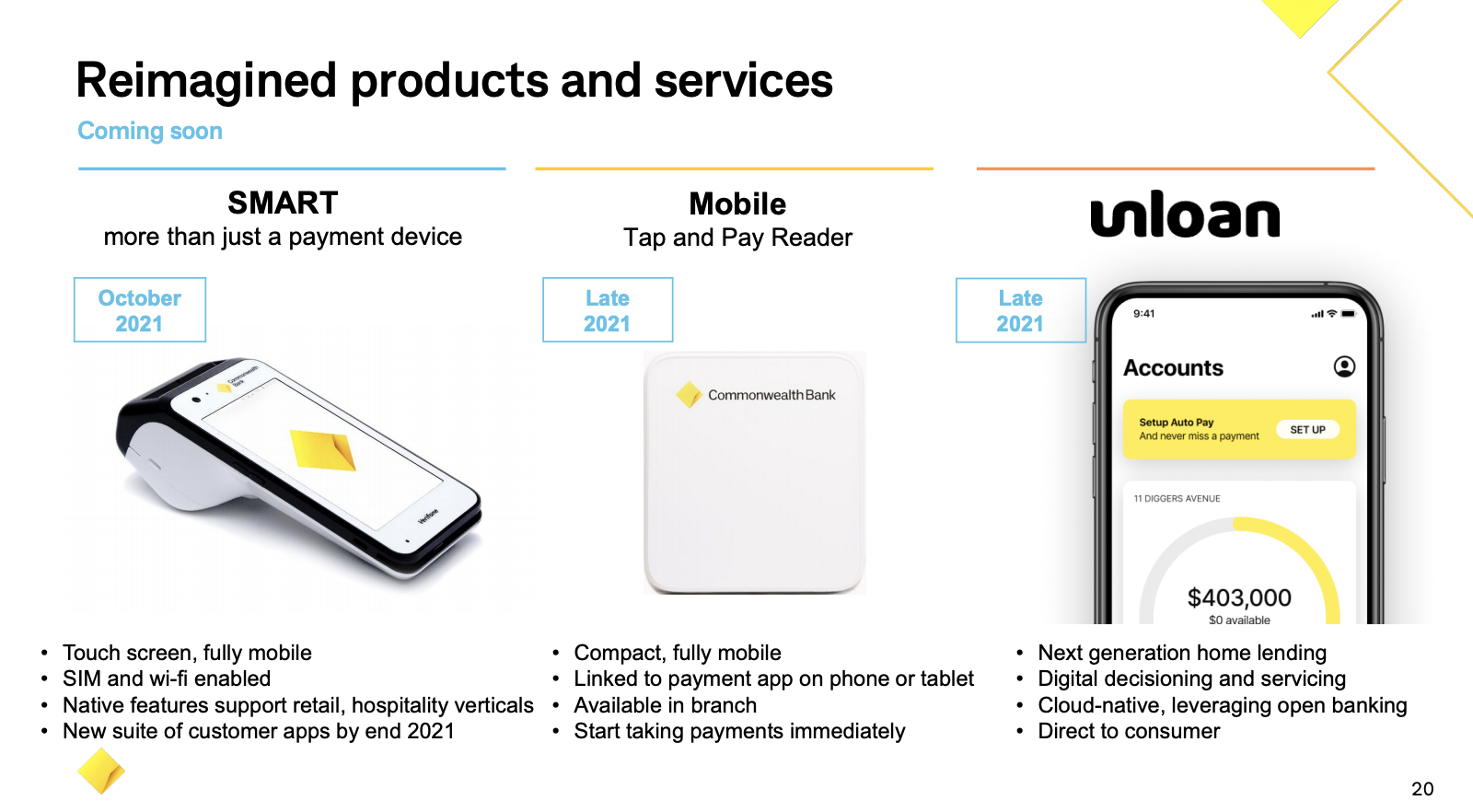Undeniable: Why CBA remains the best of the banks
Australia's biggest bank reported today and it did not disappoint. There was a wash of green, both on their financial statements and in the eyes of investors as they unloaded a mammoth $6 billion dollar buyback. This came on the back of a 19.7% growth in earnings and expanding market share. It was certainly a dense report, but the contents were not overly surprising given the solid work of management through an incredibly volatile year.
"Despite the fact that it was 160 pages to read through, it was actually pretty plain and vanilla, which is what you want....It's pretty clear what earnings have been reported, what's underlying, what's one-off and what's not great."
To discuss this result, I sat down with Andrew Martin from Alphinity Investment Management. In this wire, we explore the key takeaways from this report, the outlook for the banking sector and what investors must keep in mind about this Aussie portfolio staple.

What were the key lessons from CBA's report this year?
The big one is that all the banks are in good health with very strong balance sheets and very strong provisioning - CBA in particular. Even though things are still up in the air, they have come through the last 12-18 months very strongly. We're seeing that through the buybacks, for example. The other thing is that it still highlights is a pretty tough environment to get earnings growth. If you look at just top-line growth, we are seeing reasonably low single digits for CBA and the industry, and CBA is the bank that is taking market share, so it remains a pretty tough environment to realise growth.

Source: CBA Results Presentation and Investor Discussion Pack
Did the results beat, meet or miss your expectations as well as those of the broader market?
The result was about in line compared to myself and the market - I wasn't too far away from market expectations. It did actually beat market numbers at the bottom line, largely to do with lower bad and doubtful expenses that have come through and that's because they have been so well provided for and credit quality has turned out better than expected. If you look at a pre-provision line, it was slightly under to in-line, and part of that was higher costs. You can break that down to be partly to do with some further remediation costs, the costs that in theory should be one-off, but tend to keep going. But with an underlying view, it was fairly expected.
Were there any surprises with the result or from commentary from management?
It was a very unsurprising result. CBA tends to be quite clean in terms of its results, but given the volatility within markets and the economy through the last 18 months, it's managed to have a very clean and understandable result. We've seen a lot of these sorts of trends coming through the other banks already, so again, not surprising.
Within this environment of low rates and volatility, what is your outlook for CBA as well as the broader banking and financials sector?
Everything is a bit dynamic in the economy, particularly in New South Wales and bordering states with COVID-19. You have to caveat this with the fact that things may change, but broadly speaking we are supportive of the sector. What we're seeing with CBA today underlines why: banks are in good health from a balance sheet perspective, from both capital and provisioning and they are generating growth in earnings. Combining this with the fact that the mortgage market is certainly booming and improving, there are positive signs for banks. Investors are now realising that improvement as well as fully franked dividends. That makes the sector look pretty attractive, but you have to approach this with some caution.
We are currently considering the catalysts that may change. We don't know where things are going, but I'd say relative to last year, investors and banks have a much better idea in terms of how the underlying credit quality and volumes will react in these environments.
There's less unknown and the banks have entered this period of volatility in a much better position. This means that they don't have to top up provisions - if anything, they're currently over provided. They don't have to top up capital - they're doing buybacks instead.
So that's quite a different outcome compared to the past. If we can get a steepening yield curve and all we edge closer to interest rates going up, that will be the cherry on top for the sector.
Bringing everything together: Is CBA a buy, hold or sell?
CBA is a really solid hold for me at the moment. It is undoubtedly the premium bank in a lot of ways. It's lower risk and it dominates in mortgages which are definitely going up. It also has better technology than its peers. It's clearly got excess capital and we are just seeing step one of management's plan - I think there are more buybacks to come. In fact, even after this buyback, they have probably got that same amount again on the balance sheet that could come back in different forms. That's all really positive and it's hard to go past and not hold a stock like that. The flip side of that is that it does come at a premium price.
CBA is more premium-priced than the other banks and they always are. It's hard to say, given the run it has had, that it's an outstanding buy from a valuation perspective, but it's certainly a company that continues to deliver period on period. It's a safe hold and a business that is clearly doing better than its peers in the market as well.
CBA announced its $6 billion buyback - was this in line with your expectations, and what should investors be considering when they're deciding whether to participate or not?
It was slightly larger than that expected and part of that was we all knew that they had a fair bit of surplus capital on the balance sheet, but they continued to generate free capital as well, despite a pretty healthy payout ratio. The buyback was a bit bigger, but again what's left on the balance sheet also continues to be bigger than expected.

Source: CBA Results Presentation and Investor Discussion Pack
In terms of participating in the off-market buyback, you have to tender your shares if you want to participate. A large portion of that off-market buyback is considered to be a dividend and therefore is franked, so it comes down to individual tax circumstances - whether or not one can benefit from those franking credits. Ultimately if you do participate, it does get bought back at a lower price than what's on the market. But the flip side is that you then get, these franking credits for a potential tax benefit. It really comes down to individuals in their own personal tax situation so they need to seek advice on that.
Editor's note: For a further breakdown of whether to participate or not, see the following wire by Peter Gardner from Plato Asset Management
What do you think is the most important thing for investors to keep in mind about CBA going forward?
Even after this buyback, CBA is still incredibly well capitalised and they are likely to have another $6-7 billion sitting on the balance sheet in the next 12 months. This could come back to shareholders in the form of another buyback. Knowing that there are buybacks likely to come will support the share price going forward.
The other important point - and where CBA differentiates itself - is how they are expanding across a range of service offerings. Looking at the top line, they are taking market share within mortgages, deposits and business lending. They are growing into different parts of the other banks. The other banks all have big cost-out programmes and looking to materially lower their cost base. In comparison, CBA is taking a different view as they see themselves as already being ahead of their peers in many respects.
They have better technology, and I see them as wanting to entrench their position and that means continuing to invest. CBA does have higher cost growth than others, but the ultimate outcome of that is higher revenue growth over time. That is a point of differentiation from the other banks. CBA have their heads up investing for growth in the future, whereas others are trying to protect their franchises and the cost base, but by lowering costs.

Source: CBA Results Presentation and Investor Discussion Pack
CBA is investing in a lot of innovation to combat the continual disruption seen in the sector from nimble fintechs. Do you see value in these initiatives?
The Commonwealth Bank is probably the biggest technology company in the country. This goes back to my point earlier around the fact that they are able to continue to invest for growth because of their positioning in the market. They have dealt with a lot of previous issues, and they continue to have their heads up looking forward, whereas some of the other big peers are looking back or looking down.
I think it is an advantage that they started with an arguably better technology position than the other banks, and they can solidify their position by doing these things. And each individual one is not an enormous investment per se for CBA.
It's really starting to create that ecosystem of financial technology that should help them drive top-line growth, be much more efficient and tap into parts of the market and economy that they haven't been able to in the past. There's a defensive element to these efforts, as well.
The difference is that this is a $190 billion market cap company: they have the ability to invest in these things. Compared to the smaller fintechs, when the power of CBA gets behind an idea, they can put a lot of money into it very quickly and compete very heavily. It's a fantastic initiative for them to be doing this and in fact put a gap on the other big players, while defending their moat against some of the smaller players.

Source: CBA Results Presentation and Investor Discussion Pack
A lot of this year's positivity comes from one-offs: Divestments of underperforming arms, unwinding big provisions. Does this present a red flag for the sustainability of the earnings?
No, definitely not a red flag because it's all well known. When you try and look through and see what is actually going on in the business, selling underperforming arms is just good management. It's becoming more efficient and rewarding shareholders through cash when CBA can't use it. I don't see that as certainly a red flag at all and there's still more of that to come.
But as an investor, it's also a one-off and then you look through to what's actually going on underneath. It is still a reasonably tough operating environment for banks with ultra low-interest-rate environments. Commonwealth Bank is taking market share everywhere and they are undeniably doing better. But underlying all of this is that it remains a tough world for banks. And therefore, if we got a sniff of interest rates going up or steepening yield curve, that will be quite positive for banks going forward. Ultimately, that's where the focus should be. The one-offs seen in this result are just products of good management.
Want more earnings season Q&As like this?
Hit like so we know that you want more of this type of content and let us know what you thought about the CBA result via the comments section below.
To access more reporting season coverage please visit our dedicated Series page by clicking here.

3 topics
3 stocks mentioned
1 fund mentioned
1 contributor mentioned


